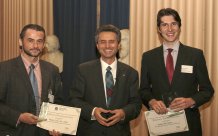
From L-R: Ciprian Ardelean, the Romanian Ambassador, Flaviu Cipcigan - winner of 'Hard Science' category. Image courtesy of Inno Brezeanu, www. romani.co.uk
PhD student awarded by the Government of Romania for contributions in the field of archaeology
Archaeology PhD student Ciprian Ardelean has won a prestigious award from the Government of Romania for his outstanding contributions in the field of archaeology.
The prize, called ‘The Ambassador's Diploma’ is awarded through the Romanian Embassy in London each year by the Government of Romania, whom recognises outstanding achievements to Romanian-born students, researchers and artists.
Ciprian was the winner for the category ‘Researchers’ and was awarded at a formal annual ‘Conference of the Romanian Students, Professors and Researchers in the UK’ hosted by the University of Edinburgh, on Saturday 20 October.
The conference was attended by important personalities in the Romanian government, as well as local researchers, professors, staff and many international students.
Ciprian commented, “I was surprised when I got nominated and even more surprised when I won, because in Romania the main topics of interest are political sciences, international relations, economics and European integration - an archaeologist winning a distinguished award is very interesting”.
Ciprian's PhD research concerns the earliest human occupations in Northern Mexico and the climate change during the transition between the last Ice Age to the Holocene epoch. His two-year field work centres around surface explorations and excavations in several newly discovered prehistoric sites in the Mexican desert, which showed early presence of human culture. Ciprian discovered a series of data that provided a previously unheard of perspective about the relationship between people and environments in early times.
The College of Humanities was delighted to award Ciprian with a small sum of money to allow him to travel to Edinburgh to receive his award.
Professor Andrew Thorpe, Associate Dean of Research and Knowledge Transfer for the College of Humanities said, “This is a great honour for Ciprian, and is a terrific day for Exeter Archaeology. But the whole College should be very proud of his wonderful achievement. It’s good news that we can recruit and nurture such talented and accomplished research students from all over the world.”
Ciprian’s research was financed by Mexican institutions and by a grant for radiocarbon dating (a radiometric dating method that uses the naturally occurring radioisotope carbon-14 (14C) to estimate the age of carbon-bearing materials up to about 58,000 to 62,000 years) received from the Natural Environment Research Council (NERC). He has presented the preliminary results of his research in international meetings in the USA and Mexico, and in the United Kingdom at The University of Exeter, The University of Oxford and The University of Cambridge.
Ciprian, who lives in Mexico, is currently finishing his thesis under the supervision of Dr. Bruce Bradley and Dr. José Iriarte. In addition to completing his PhD, he holds a lectureship and research position at a local university.
Professor Bruce Bradley adds, “It is very gratifying to have a student of Ciprian’s standard and to see that his hard work is recognised at an international level. It is also verification that Archaeology at Exeter is of the highest calibre”.
For more information about postgraduate study in Archaeology at the University of Exeter please see the Department of Archaeology website. Please see the ‘Conference of the Romanian Students, Professors and Researchers in the UK’ website for more information about the award.
Date: 30 October 2012
